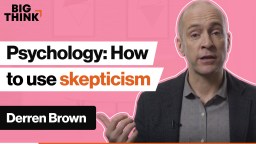critical thinking
A new study looks at why mysterious voices are sometimes taken as spirits and other times as symptoms of mental health issues.
For centuries, universities have advanced humanity toward truth. Professor Jonathan Haidt speaks to why college campuses are suddenly heading in the opposite direction.
Some volunteers performed above chance. They weren’t the psychics.
A critical thinking framework developed by psychologists can help teach mental skills necessary for our times.
Derren Brown returns to the stage with his new live, one-man show, Showman. Check it out here.
▸
6 min
—
with
Every day, humanity generates 2.5 quintillion bytes of data. Every minute, users are sharing nearly 500,000 tweets, watching more than 4 million YouTube videos, and conducting more than 3.6 million […]
“Trust is so important to how we scale an idea. Without that trust, we don’t take risks. And without risk we don’t build that next big thing,” says Nilofer Merchant, […]
Don’t settle for comfortable and familiar thoughts, reach for what you don’t know, says Harvard professor Stephen Greenblatt.
▸
7 min
—
with
All science begins with a leap of intuition, says Richard Dawkins, but we can only ever find objective truths by knowing when to let evidence take over from emotion.
▸
4 min
—
with
Your brain stops at the most comforting thought. The truth is somewhere beyond that. Using scientific skepticism as a guide, astrophysicist Lawrence Krauss outlines the questions that critical thinkers ask themselves.
▸
6 min
—
with
Can democracy remain vibrant if the public, and especially children, don’t have the tools to distinguish sense from nonsense?
▸
6 min
—
with
One of the lesser-discussed but potentially most disastrous appointments is in education: Betsy DeVos. Her anti-intellectual agenda would take root in the nation’s youngest minds, filtering down through descendant generations.
There is censorship in science, admits Bill Nye – but not nearly as much as there should be.
▸
5 min
—
with
The trouble with labeling everything a “fallacy” is that (1) not all poor reasoning is automatically fallacious, and (2) it implies that everybody would agree on everything if we could only think correctly.













